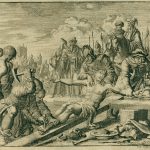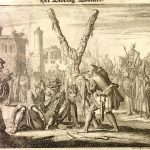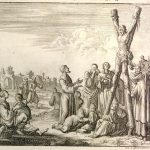Silence filled the universe. Earth rotated slowly, flying around the sun with the moon; the stars whirled through space, shining brilliantly; and the asteroids dodged here and there: but all was silent.
Even Heaven was silent. The usual shouts of joy and praise for the Almighty that could be heard coming from the dwelling place of God were not heard at the moment.
All eyes were transfixed on the earth. Something was happening.
—
Earth. So much had happened upon its surfaces since God created the place. God remembered the lovely Garden, where He had perfect relationship with Adam and with Eve. Those were wonderful times; even the Almighty, who was far above His creations, cherished the memory.
But the good time was short. Man rebelled and brought the curse upon all of creation. Generation after generation turned their faces against the Almighty and wandered after their own thoughts and desires. God remembered the frustration that He felt when the Israelites—His chosen people—began worshiping fake gods of wood, silver, and gold. He knew that what they truly longed for could only be found in Himself. He sent prophet after prophet to tell them this, but they only murdered one after the other, and plugged their ears. They did not even attempt to see if what the Almighty said was true.
The humans deserved to die as a penalty for their crimes against God, but He wanted to save them from their penalty of death. So the Almighty had a plan. From the very beginning of the curse, God knew what He would do. The humans did not understand when He sent a flood, but saved them; or when they were slaves, but He freed them. They did not understand the countless times that nations and armies rose up to destroy the People of God, and He defended them by His own might. After all of this, even the people whom the Almighty had specifically chosen to lead the world in righteousness had spurned the loving God. They were blind, very blind. But God wanted the humans to know Him–He wanted them to have peace, which truly only comes from Him. Therefore, the Almighty went to them Himself. He took on the form of their own sinful flesh and demonstrated to them what it meant to commune perfectly with the Father-God. He, the Almighy-in-Flesh, dwelt among them and lived perfectly. He showed them that He was the only Way to peace and the only Truth of Life. And then, since the humans were fallen and completely helpless to save themselves from their own filth, He—the Almighty-in-Flesh—died for them.
And silence filled the universe.
—
The Almighty-in-Flesh had died. Wicked man had brutally murdered Him and spilled His blood all over their hands.
The earth rotated once.
God’s followers ran and hid from the evil humans: it seemed Evil had triumphed.
The earth rotated twice.
Creation groaned under the curse: its only Hope for restoration had died.
But on the third day a breeze shook space as if Heaven had gasped and a light came forth upon the earth. Everything stopped: the earth, the moon, the stars, the asteroids—even the sun stopped rotating for a moment. But then…
All of creation burst into full song, praising the Almighty with everything they had inside them! The stars whirled through space as fast as they could, letting forth brilliant light and rhythmic sounds because the Almighty had risen! He was alive! Asteroids pounded the planets, and dogs barked; fish swam and birds flew. Evil had not won, but had been conquered! The mountains shook with wonder, and the forests trembled with praise. The oceans roared and the whales turned and splashed and made noises to their Creator. Heaven resumed its music with even greater shouts of joy and louder praises of God’s holiness! Sin would never have to reign over man again; the Almighty had conquered it for all humanity, for He had become human and He had won. Man could worship Him again. God could commune with Adam and with Eve once more. And nobody heard the distant scream of Hell’s defeat because new praises of God resounded from the earth, and the heavens were filled with new songs to the Almighty.
And some day, everything will come together with a clap. The curse will reverse. The generations will sing with adoration. Loved ones will be united. Joy–unadulterated joy–will be restored. And God will dwell with men.
“O sing to the Lord a new song, For He has done wonderful things, His right hand and His holy arm have gained the victory for Him. The Lord has made known His salvation; He has revealed His righteousness in the sight of the nations. He has remembered His loving kindness and His faithfulness to the house of Israel; All the ends of the earth have seen the salvation of our God.
Shout joyfully to the Lord, all the earth; Break forth and sing for joy and sing praises.
Sing praises to the Lord with the lyre, With the lyre and the sound of melody. With trumpets and the sound of the horn Shout joyfully before the King, the Lord.
Let the sea roar and all it contains, The world and those who dwell in it.Let the rivers clap their hands, Let the mountains sing together for joy
Before the Lord, for He is coming to judge the earth; He will judge the world with righteousness And the peoples with equity.”
– Psalm 98
C.D.


